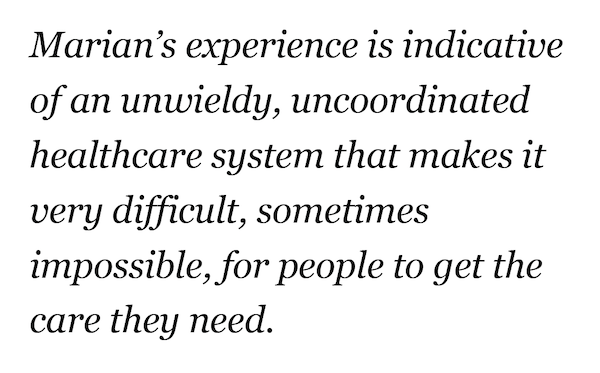Marian Whitney’s transition from the hospital to her home was overwhelming. She was in a lot of pain and could not take care of herself.
A couple of years ago, Marian Whitney’s life turned upside down while taking her dog Sofie for a walk. “The steps were wet that day, and I was wearing flip-flops, which I probably shouldn’t have been. I slipped and ended up shattering my elbow!” Marian’s neighbor took Sofie while she went to the hospital. Fifteen days and two surgeries later, Marian returned home, “grouchy from all the meds and in a lot of pain,” unable to cook, drive, or even take a shower by herself. Fortunately for her, her sister from Mariposa and a friend from Merced helped her get set up, but after a few days when they left to go back to their own homes, Marian found herself alone, trying to manage a web of details, instructions, and daily activities in the middle of a pandemic shut down. “When I left the hospital, I didn’t know a lot. I needed help… but I knew ACC connected people to a lot of resources.” She reached out to staff at ACC and got advice about asking for in-home physical therapy and other services. And they connected her to resources like home-delivered hot meals. “ACC was a godsend. It was a long recovery. If I had to do it by myself, it would have been very hard. I would have ended up in a nursing home.”

Marian’s experience is indicative of an unwieldy, uncoordinated healthcare system that makes it very difficult, sometimes impossible, for people to get the care they need. When people have to be their own care coordinators, it can be overwhelming, resulting in the loss of independence, more trips to the emergency room, rehospitalization, or skilled nursing. Our ACC Caregiver Support Team receives inquiries from people who are concerned about their own or a loved one’s safety and care needs on a daily basis: people living alone who have health needs but don’t feel safe driving, concerned children of elders who have started falling, who have been diagnosed with dementia, or who will soon be discharged from a nursing facility.
“All these concerns inevitably end with the question ‘Where do I go from here? I have no idea where to start,’” says Soojin Yoo, ACC’s Caregiver Support Services Manager. “Most seniors and caregivers share their confusion and frustration while trying to make sense of the long-term care services in our society. ‘Which program helps pay for in-home or residential care costs?’ ‘Where can I find care services that match my unique needs?’ ‘My loved ones refuse my help, so how do I make this happen?’ The burden to navigate this complex system increases to an even greater extent if you are from different cultures, not using English as your primary language, are challenged financially, or living in a remote area.”
It is nearly impossible for anyone to navigate the maze of a long-term care system composed of Medicare, Medi-Cal, Older Americans Act (OAA) funded services, VA programs, and other local resources from both for- and not-for-profit agencies, while spending most of their time and energy caring for their daily needs or the daily needs of their loved one. It’s especially challenging when in a transitional state, like returning home from the hospital or from a skilled nursing facility, when people have recently experienced an acute medical condition, received multiple care instructions and medicines, and don’t know whom to call with questions.

That is why ACC started providing Caregiver Support in 2014 and became a core partner of the Sacramento County Aging and Disability Resources Connection (ADRC) in 2022. Anyone in need of assistance related to aging can receive care navigation and management services from ACC at no cost. Compassionate Care Team staff with professional backgrounds listen to your situation, understand your family’s needs, guide you to help with personalized referrals, and provide ongoing support for care planning and problem-solving as long as you want.
But we know that isn’t enough. There is a tremendous need for more care coordinators, caregivers, and other direct care workers to meet the demands of an aging population. Recently ACC became a partner in a CalGrows Innovation Fund program to increase the development and retention of direct care workers. The program will provide in-person and virtual classes at no cost to direct care workers and generous incentive pay for those who complete their training. Family caregivers are also eligible to take the classes at no cost.
Marian Whitney is one of those workers who is looking forward to benefiting from this program. Now mostly healed from her fall two years ago, Marian is about to start a new job as an in-home caregiver. She will be doing light housework, driving people to their appointments, taking them shopping, and providing companionship. “I really appreciated the help I received. Now I feel glad to help other people. It’s so rewarding. People need help and they need help from people they can trust. They need it and they deserve it.”
Jeri Shikuma, MPH, is ACC’s Home and Community-Based Programs Administrator.


Add a Comment